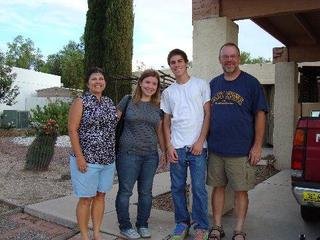Wednesday, September 19, 2007
Picasso: The Search for Humanity
Picasso's work included several different styles. To view samples of his work, go here.
I believe that Picasso sought to understand the human condition; to discover what it means to be human. He explored this through several subjects in his art.
Three works that are exemplars of his thought are:
Les Demoiselles d'Avignon, which was widely condemned by Picasso's contemporaries, but clearly illustrates Picasso's preoccupation with sexuality.
Guernica depicts the horrors of the bombing of civilians during the Spanish Civil War.
Breakfast of a Blind Man is from Picasso's blue period, and is a somber study in deprivation and suffering. It is interesting to note that it was painted at a time of deep poverty in Picasso's life.
Sunday, we will discuss the meaning of Picasso's art and the significance of his search for humanity. The worship bulletin with Scriptures is here.
Another really good article
I spent too many years striving to become a “somebody.” Wherever it was, I learned what kind of people received attention and acclaim, and aimed to achieve worth and acceptance by becoming one of them. Unfortunately, it was a moving target. Let’s see … in college I became the lean, mean fitness machine Jim, then morphed into the debate team champion Jim, and finally became the campus ministry superhero Jim. I even dated the star player on our women’s basketball team, and became a “somebody” through the back door … well, until she dumped me!
I didn’t learn my lesson very well, and after college I continued searching for ways to become a “somebody.” My avenue for seeking identity was positions of Christian leadership. I was bent on becoming one of those cutting-edge revolutionaries everyone looked at and said, “Wow!” It was the perfect scenario; I would be someone significant by influencing countless people for Christ, and God would be thrilled! It sounds good, but it became a prison. As long as my sense of identity was tied to performing and achieving, even for God, it only led to emptiness, weariness, fear and the burden of doing more.
Jesus said, “Unless a kernel of wheat falls to the ground and dies, it remains only a single seed. But if it dies, it produces many seeds” (John 12:24, TNIV). I discovered a path to freedom in Jesus’ words. God awakened me to the fact that I have a spiritual identity, which previously I had been clueless to while I was consumed with creating a human one. Jesus’ words were inviting me to stop striving to become a “somebody” and instead accept the identity I already had by divine birthright.
It’s been a journey uncovering the real Jim buried beneath all the things I clung to for worth and acceptance. One huge “aha!” moment along the way came from John’s three-word description of God: “God is love.” The word "is" grew in significance because I realized that it’s more than just the fact that God sometimes does loving things, but that in every moment and in all things God is continuous and perfect love. If God is love, then that makes me loved, not based on what I do but who He is. If, as the Bible teaches, God dwells within me, then the source of continuous and perfect love is inside me. I don’t need to seek love outside myself; it is present within me in every moment. The more I turn toward God’s love within me, the less driven I seem to be to chase after becoming a “somebody” in the world. I am content by receiving God’s love.
It also occurred to me that if “God is love,” and I am an image or reflection of God, then likewise I am love. Maybe living out my spiritual identity is simply being love. It’s not so much what I do, but whatever I’m doing that I am being love. Paul said that even great faith and sacrifice have no value apart from love. Perhaps the purpose of my human journey is to turn love inside out: to receive, accept and depend upon God’s love for me, and allow this love to be expressed as me. No more striving, no more burden to become a “somebody,” no more fear of God’s displeasure or disapproval—just resting and abiding in and being love.
It’s ironic that now that I am a published author, people ascribe to me this “somebody” status, but it has no value for me. When people ask, “What is it like being an author?” it strikes me as an odd question, because I don't think of myself as “an author.” Writing is an important aspect of my life, but I don't think of it as the core of my identity. On those terms, I could just as easily identify myself as a husband, father, neighbor, animal lover and cycling enthusiast. And yet behind all these I know that my true identity is a spiritual one. I am loved, and I am love. Whatever level of human success you may experience, it can’t be the source of true contentment. I don’t “need” to publish books; I was a writer before I got published, and I would keep writing if I never published another book.
In the introduction of my book, Wide Open Spaces, which releases in November, I share how God has freed me from deriving my sense of worth and identity from my ranking on Amazon.com. The truth of who I am in God, the real Jim Palmer, is fully intact in every moment. Let it go! There is no peace and contentment in becoming a “somebody.” Instead, envision this: God looks at you and sees a reflection of Himself, and smiles.
Jim Palmer is the author of Divine Nobodies: Shedding Religion to Find God (and the unlikely people who help you) (Thomas Nelson).
This article is from Relevant Magazine's weekly email. www.relevantmagazine.com

